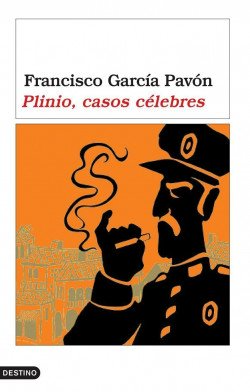Collection of 33 novels
Intuition and keen understanding of human nature.
Plinio is a local policeman. He is the head of the Municipal Police of the town of Tomelloso, in La Mancha (Spain), far away from the hustle and bustle of the city and cosmopolitan places like Paris or London. His actual name is Manuel González, but everyone knows him as Plinio. He does not stand out for his physical attractiveness, his existential crises, his moral problems, nor does he have a torturous past. Plinio is simply a quiet man, very much of his people, skeptical and reasonably conservative, and he is, above all, a police officer who pursues crime calmly, but with determination and spectacular intuition.
His nickname is a family legacy: a great-uncle of his was nicknamed that way “because of some Latin thing”. Plinio is a humble detective, an anti-hero who uses common sense and the knowledge he has of his neighbors to solve his cases. An approachable and pragmatic man who needs neither laboratories nor forensics. He pays attention to everything around him and that is enough for him. His best weapon is his intuition or, better said, “his hunches”… he is a thoroughbred bloodhound.
With the help of his faithful friend, the town veterinarian Don Lotario, they face the most diverse crimes-, which reflect the darkest side of their neighbors: poverty, envy, pettiness in all its manifestations… And the upper crust of town, who are capable of ruining Plinio’s life with just one call to Madrid-
Plinio’s fame spreads like wildfire, and he is called upon to solve many cases. Like Don Quixote and Sancho, they travel through La Mancha, but instead of riding Rocinante and the donkey, they drive a Seat 600. Surrounded by all of the local rumors, they face disappearances and appearances, corpses, suicides, murders, and Spanish ham thefts. In addition to all of the local rumors.
Plinio becomes so successful that, despite his adversaries, he is even called to solve some cases in Madrid.
RELEVANT DATA: Francisco García Pavón has his own place in the history of Spanish crime literature. With the Plinio collection, he became the pioneer of the Spanish detective novel. Authors of the stature of Lorenzo Silva establish the bases of Spanish crime fiction in the novels of García Pavón, who makes use of humor, intrigue, portrayal and the customs and manners of deep Spain, moving away from British and American paradigms.
Plinio is much more than an investigator who exudes humanity, he is a timeless character, socially very relevant today, and adored by generation after generation. He is reminiscent of a Spanish Father Brown (BBC). He has great potential to be a re-modernized classic like Lupin (Netflix), or Sherlock (BBC). The character’s modern adaptation is not only possible but also essential.
The character of Plinio is the core of a long-seller collection consisting of a total of 31 novels. All his adventures take place in the towns of La Mancha, except for the crime of The Colored Sisters (Las hermanas coloradas), which takes place in Madrid.
García Pavón was the winner and finalist of the prestigious Nadal Award with his collection of Plinio, the winner of the Criticism of Castilian Narrative Award, the Antonio Machado Short Story Award, the Award for Police Narrative, the Cinematography and Tourism Award, and many other awards from the media outlets El correo literario,
Meridiano and the magazine Ínsula. The writer has a literary award named after him for Best Crime Novel.
What the critics have said:
“Francisco García Pavón was the first with the courage to challenge the complexes and turn a Spanish policeman into a hero. and turn a Spanish policeman into a hero.” Lorenzo Silva.
“In García Pavón’s novels, picaresque and cunning go hand in hand.” El Mundo.
“García Pavón sought, from the beginning, to give the Spanish detective novel its own identity and for this, he turned to the memories, experiences, anecdotes, and customs that he knew, those of his own town of Tomelloso.” Goodreads.
“Anyone who has not read García Pavón should do so. His style, accurate and Cervantes-like, is perfect for the traditional detail.” Actualidad Literatura.
“He approaches the genre known as a detective novel as a mixture of the strict detective, with costumbrist elements and social criticism, as far as it was possible at the time. This has placed him in a singular place in the history of the Spanish crime novel.” Lanza. Diario de La Mancha.
AUDIOVISUAL POTENTIAL: Serie TV, Miniserie, Film, TV Movie.
LANGUAGES AVAILABLE: Spanish, English, Italian, Romanian.

Adquirir los derechos
Para ponerte en contacto con nosotros completa el siguiente formulario y te responderemos en breve.
Error: Contact form not found.

